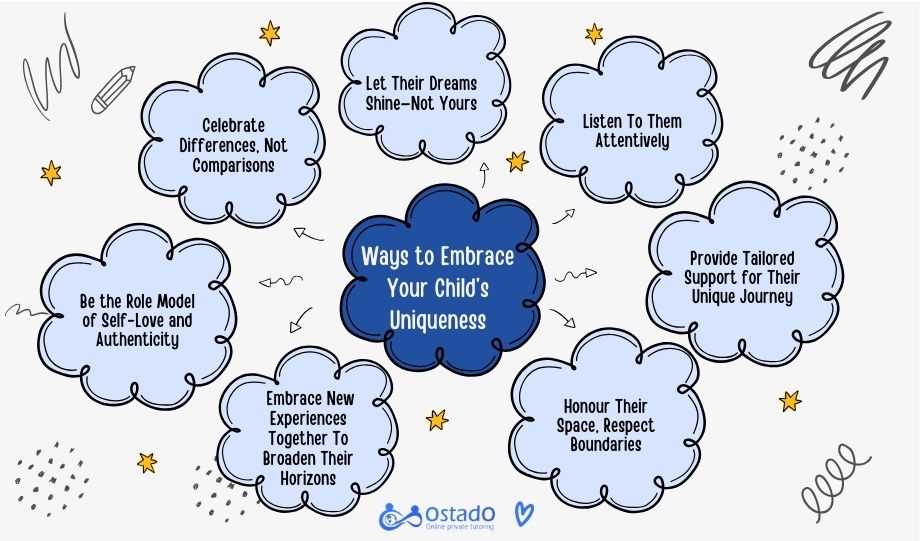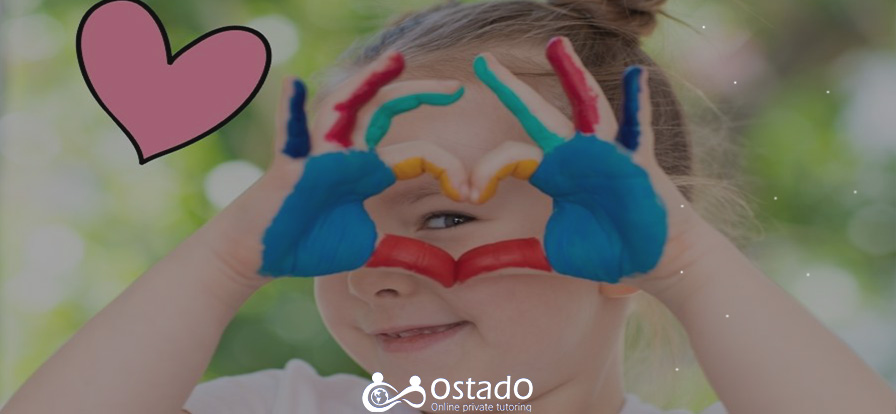The person you see when looking in a mirror is the only person like you in the whole world, and so is your child. Uniqueness is an intrinsic quality that stays with us forever, but it deserves extra attention in the first five or six years of your child’s life. Your child’s uniqueness can be easily overlooked if you don’t know how to appreciate it, and unfortunately, it’s a window that closes soon.
So, how can you celebrate your child’s uniqueness to build confidence in them and create a bright and healthy self-image? Let’s find out.
Just one thing: There is no black or white when talking about people. We are in the grey here. So, the words below are not set in stone.
“Jean Piaget (Developmental Psychologist): “Each child is an artist and an explorer in their own way. They construct their knowledge actively, shaping it from their individual experiences.”
What Makes a Kid Special?
You don’t have to dig deep to understand what is meant by uniqueness in children because we’re talking about lovely, simple little creatures. However, we can approach uniqueness from two perspectives.
From the Parent’s Perspective
You may still be lovely, but you’re not “simple little creatures” anymore. So, your take on uniqueness is different from that of your child. It’s hard to remain objective when talking about your child. I read on Quora that a parent frankly defined their child’s uniqueness in the very fact that s/he is their child.
- Focusing potential
Your understanding of uniqueness might be futuristic. That is, you observe your child’s behaviour and interpret it as a potential or something they can be successful at in the future.
- External point of view
Unless you can completely identify with your child, you’ll have an external viewpoint of their uniqueness. You may interpret it in terms of academic achievements (beautiful drawings) or talents (playing a musical instrument). These are not entirely intrinsic qualities.
- Comparative viewpoint
Another element that affects your definition of your child’s uniqueness is how you compare them with other children or their siblings. You might say: “He is just as delightful as Jack when he was five.” This should, of course, be avoided. I’ll get there in a bit.
From the Child’s Perspective
A child’s view of uniqueness is not as conservative as yours. They’re more liberal in defining how they’re unique.
- Emphasis on the present
Children focus on who they are now rather than who they might become in the future. This leads them to have a more inclusive definition of uniqueness. So, in their world, being able to eat two entire layer cakes in one sitting can be a kind of uniqueness.
See? We can learn from a six-year-old to focus on the present if we’re looking for more options and fewer limitations.
- Emphasis on abstract elements
Children tend to associate uniqueness with feelings. Their inner world (imagination, emotions, interests, hobbies, etc.) influences their idea of their uniqueness.
- Emphasis on self
Let me not sugarcoat this. Children are egoistic and self-centred. When they define uniqueness, you can sense the strong presence of “I” in their statements. I drew this! I dialled my dad’s cell phone number. I refilled the ice trays.
Identifying Your Child’s Special Qualities
Eating, sleeping and playing around. That’s what to expect from a child. You have an opportunity to find out how special they are when they’re playing around.
You need to take part in their activities but let them remain at the centre of the activity. Just be a participant. Let them welcome you to their world and then observe what’s going on in there.
- Do they prefer to spend more time with other kids or have more alone time?
- Do they like to lead or follow the lead?
- Does s/he depend on you, or is s/he a go-getter?
- Do they prefer jumping on the trampoline or doing a puzzle?
- Do they prefer listening to a story or watching a cartoon?
- Do they like the rules of the game, or do they prefer to create their own game?
The answers to these questions can tell you in what ways your children are special.
My colleague has dedicated a post to “What Are Your Child’s Interests?” Click to learn how you can spot these interests. Also, it’s best if you can make the time to read The Child Whisperer by Carol Tuttle. If you’re a listener, you can benefit from the podcasts as well.

How To Recognise Your Child’s Uniqueness
Even identical twins have different personality traits. In fact, findings from a recent article, “Comparison of Self-Differentiation and Identity Statuses in Twins and Nontwins,” show that self-differentiation in twins is significantly higher than in nontwins. Here’s how to celebrate the differences that ultimately shape their individuality.

1. Avoid Comparison
Focus on your child’s strengths and cherish them for who they are. Comparing your child to other pupils might convey the message that their accomplishments are undermined and unappreciated. On the contrary, when you celebrate their achievements, no matter how small, they’ll develop a sense of self-worth.
“Jean Piaget (Developmental Psychologist): “Each child is a different kind of flower, and all together make this world a beautiful garden.”
- Example: Instead of saying: “Your sister would finish her homework very quickly. I don’t know what’s taking you so long!” You can say: “I love how you concentrate on your homework and spend a lot of time getting it right!”
2. Don’t Live Your Dreams Through Your Children
Don’t impose your wishes or dreams on your child. Let them have a childhood of their own, pick their own toys, and play their favourite games. Your role as parents is to lovingly protect them, not to ruin their childhood memories.
- Example: If you and your spouse don’t have a good job and income, you may wish your child to continue their education to higher levels and do your best to support them. If it’s what they desire, fine. But if they want to be, for example, a professional swimmer, you should only encourage them.
3. Listen Attentively
Dedicate enough time to hear your child. Take them out for a spin or take them to their favourite place. Ask them how they’ve been and let them do most of the talking. Don’t interrupt them; it’s listening time.
This quality time helps them reinforce that their feelings and experiences are important and fosters the bond between you and your child.
Additionally, keep an eye on their behaviour and reactions. Sometimes you have to read between the lines because your children can’t directly share their concerns and problems with you. You should elicit these concerns and address them.
Erik Erikson (Developmental Psychologist): “A child’s cry for help is not always verbal; we must learn to listen with more than our ears.”
- Example: If they tell you they hate their soccer training classes and that they’re not good at it. Instead of trying to persuade them why they might be wrong, ask them what’s bothering them. It’s important to teach them persistence but not push them too hard.
4. Offer Personalised Support
It’s a tricky part of parenting. You don’t want to help your child with every situation or decision because you’ll impede the development of their decision-making skills. On the other hand, you can’t just sit back and let them know the ways of the world all by themselves. We’re not Vikings.
Instead, you should offer appropriate support based on the situation, their personality, learning style, and emotional needs. So, try to avoid a “one-size-fits-all” approach to parenting. You can find more details about “Supporting your child” here.
Carl Rogers (Humanistic Psychologist): “When the other person is hurting, confused, troubled, anxious, alienated, terrified; or when he or she is doubtful of self-worth, uncertain as to identity—then understanding is called for. And children, more than adults, often need to be understood.”
- Example: If they’re struggling at school and can’t keep up with other pupils, dedicate some time to help them with their homework. Try to create a quiet and relaxing environment where they can concentrate. If it doesn’t help, you can try getting help from a professional KS3 tutor to diagnose what’s impeding the learning process and help the child overcome it.
5. Respect Their Boundaries
It’s very satisfying for parents to be all cuddly and kissy around their children. While it’s essential to show affection, you must respect their physical or emotional boundaries.
Also, getting too close to your children will get them too attached to you, which, in turn, makes them dependent on you and impedes their autonomy and decision-making.
Maria Montessori (Educational Psychologist): “We must help the child to act, think, and will for himself. This is the art of serving the spirit, an art which can be practised to perfection only when working among children.”
- Example: If you have an introverted child, they probably need some alone time after school to recharge and cool off after being in a crowded environment. So, don’t arrange gatherings or parties after school. If they prefer to eat lunch in their room, don’t force them to sit at the lunch table.
6. Expose Them To Diverse Experiences
Take your child to concerts, movies, or even the church. Allow them to get to know different people and different ideas. This makes them more flexible and tolerant of differing ideas.
If you’re too protective, you’ll give them a feeling that the world is dangerous, which might cause them to retreat to their comfort zone. So, let go of their hand every once in a while, but keep an eye on them.
Erik Erikson (Developmental Psychologist): “A child’s sense of autonomy and initiative must be respected. We should not intrude upon their natural inclinations without reason, for this fosters independence and trust in the world.”
- Example: If your child asks you to spend a night in a friend’s house, don’t refuse readily. If her friend’s family is a good host and is open to this idea, why not let your child have some fun?
7. Model Self-acceptance and Authenticity
There is a famous quote from Carl Jung, a well-known Swiss psychiatrist and psychoanalyst: “Children are educated by what the grown-up is and not by his talk.”
Your child looks up to you as a role model. You should demonstrate that you accept yourself and believe in yourself if you want them to acquire self-acceptance. This helps them value themselves despite the flaws they might have.
- Example: If you make a mistake, don’t try to hide it. Instead, admit to it and make an effort to fix it. Let your child know that mistakes are simply a way of learning new things. This teaches them it’s OK to be imperfect.
Why Your Child’s Uniqueness Matters
Your child’s uniqueness directly contributes to their sense of identity, and if neglected, it can hamper their development. The following are other reasons why appreciating your child’s uniqueness matters.
- Developing self-confidence: When your child understands s/he is a one-off, they develop a strong sense of self-worth.
- Lifelong well-being: Appreciating your child’s uniqueness helps them develop a sense of purpose in life. This purpose contributes to their mental health and overall well-being.
- Acceptance of others: When your child feels unique, they can more easily accept others for who they are. This makes them more empathetic, kind, and open-minded.
- Dealing with pressure: As children grow older, they have to deal with peer pressure and societal expectations more and more. Their sense of self dilutes the need to conform and encourages them to stand up for themselves and be proud of who they are.
- Attaining independence: Respecting your child’s individuality empowers them to find a solution for their problems in their unique way. Also, it makes them better decision-makers.

